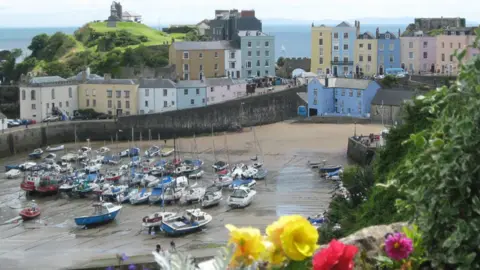Pembrokeshire tourism team axe 'would send negative message'
 Susan Powell
Susan PowellA cash-strapped council could axe its tourism department in a bid to save money - despite the industry's vital role in the local economy.
The move would save Pembrokeshire County Council £132,000 a year - less than 0.1 percent of its budget.
But a report said the team generated £1m of press coverage a year and helped firms access millions in grant aid.
It said the council should be a "major player" in relation to tourism but recognised the financial pressures.
The council has combined its efforts with others, such as the Pembrokeshire Coast National Park and local businesses, in the Destination Pembrokeshire Partnership since 2010, according to the Local Democracy Reporting Service.
A council review of the partnership has pointed to successes such as a boost in cruise ship visits, more award-winning hotels, and the highest number of Blue Flag beaches in Wales.
The report, to be discussed by the council's partnerships scrutiny committee on Thursday, said the authority's tourism department had already made savings in recent years, such as not replacing its manager who retired in November.
Closing the department - along with the Tenby tourist information centre - would send a "negative message" to funding bodies such as Visit Wales, which may put their money elsewhere, the report warned.
A peer review showed tourism operators already felt the sector "does not attract high level support" within the council, despite being worth £585m a year to the Pembrokeshire economy, it added.
The report pointed out that even if funding for tourism marketing was scrapped, money would still need to be spent on destination management issues such as beach cleaning, bus services, toilets and car parks.
Councillors will be asked whether this would mean setting up a new organisation to replace the partnership, with interested parties pooling their resources.
